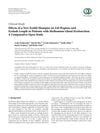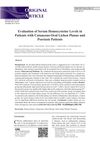 February 1938 in “Journal of the American Medical Association”
February 1938 in “Journal of the American Medical Association” Washing can prevent cancer from lubricating oils, extreme body temperatures need more study, Sulfomid is not recognized, no reliable diphtheria carrier treatment except surgery, eyelid injuries should heal before repair, heterophile antibody test is specific for mononucleosis, chlorine inhalations for colds are outdated, and wheat germ is safe.
13 citations,
January 2019 in “Journal of the American Academy of Dermatology” Most people using biotin don't see skin improvements, and it may affect lab tests, so doctors shouldn't suggest it without confirming a deficiency.
 May 2017 in “Journal of The American Academy of Dermatology”
May 2017 in “Journal of The American Academy of Dermatology” More people are becoming allergic to natural products like propolis and marigold, especially women.
 97 citations,
April 2016 in “Andrology”
97 citations,
April 2016 in “Andrology” Hormones and metabolism play a complex role in prostate enlargement, and more research is needed to improve diagnosis and treatment.
 14 citations,
October 2006 in “Journal of The American Academy of Dermatology”
14 citations,
October 2006 in “Journal of The American Academy of Dermatology” A woman with Parkinson's disease experienced hair loss from the Parkinson's medication pramipexole, which improved after stopping the drug.
 10 citations,
January 2015 in “Journal of Cutaneous Medicine and Surgery”
10 citations,
January 2015 in “Journal of Cutaneous Medicine and Surgery” Cold caps and certain drugs may help prevent or reduce hair loss from chemotherapy, but more research is needed.
 9 citations,
January 2014 in “Medical Hypotheses”
9 citations,
January 2014 in “Medical Hypotheses” Higher DHT in male baldness may protect against prostate cancer.
 6 citations,
November 2010 in “Histochemistry and cell biology”
6 citations,
November 2010 in “Histochemistry and cell biology” The proteins transthyretin and megalin are more present in the growth phase of hair, suggesting they might affect hair health and growth.
 4 citations,
March 2021 in “International Journal of Dermatology”
4 citations,
March 2021 in “International Journal of Dermatology” COVID-19 and related stress may increase hair loss known as Telogen effluvium.
 May 2020 in “JAAD case reports”
May 2020 in “JAAD case reports” Using anthralin and calcipotriene together might help treat tough cases of alopecia areata, but more research is needed to understand how it works.
 February 2018 in “Medicine - Programa De Formación Médica Continuada Acreditado”
February 2018 in “Medicine - Programa De Formación Médica Continuada Acreditado” Minoxidil and finasteride are the main FDA-approved treatments for hair loss, with other methods showing promise but lacking strong evidence.
 February 2012 in “Expert Review of Endocrinology & Metabolism”
February 2012 in “Expert Review of Endocrinology & Metabolism” The document suggests more research is needed to understand the link between baldness and prostate cancer.
 363 citations,
May 2006 in “Current Opinion in Psychiatry”
363 citations,
May 2006 in “Current Opinion in Psychiatry” Anorexia and bulimia lead to serious health problems and increased risk of death, requiring aggressive treatment.
 126 citations,
January 2009 in “International Journal of Trichology”
126 citations,
January 2009 in “International Journal of Trichology” Oxidative stress contributes to hair graying and loss as we age.
 79 citations,
January 2017 in “Dermatology practical & conceptual”
79 citations,
January 2017 in “Dermatology practical & conceptual” Correcting nutrient deficiencies may help with hair loss, but the benefits of supplements without a deficiency are uncertain and could be harmful.
 69 citations,
February 1983 in “Gut”
69 citations,
February 1983 in “Gut” Men with coeliac disease may have hormone imbalances that could affect sexual function, but these can improve with better gut health.
 64 citations,
January 2009 in “Gynecological Endocrinology”
64 citations,
January 2009 in “Gynecological Endocrinology” Myo-inositol helps improve skin conditions and metabolic profiles in young women with PCOS.
 46 citations,
March 2001 in “Journal of endocrinological investigation”
46 citations,
March 2001 in “Journal of endocrinological investigation” 5α-reductase inhibitors, like finasteride and dutasteride, effectively treat BPH, male baldness, and hirsutism, with potential for acne and prostate cancer prevention.
 18 citations,
July 2010 in “Expert Review of Endocrinology & Metabolism”
18 citations,
July 2010 in “Expert Review of Endocrinology & Metabolism” The document concludes that PCOS has a strong genetic component, but more research is needed to fully understand the specific genes involved.
 17 citations,
January 2010 in “International journal of trichology”
17 citations,
January 2010 in “International journal of trichology” A man experienced hair loss from radiotherapy, which can be temporary or permanent depending on radiation dose, with potential treatments available.
 14 citations,
November 2018 in “Journal of Cosmetic Dermatology”
14 citations,
November 2018 in “Journal of Cosmetic Dermatology” PRP therapy safely improves hair growth in people with hair loss.
 13 citations,
January 2016 in “Journal of Ophthalmology”
13 citations,
January 2016 in “Journal of Ophthalmology” A new eyelid shampoo improved eyelid hygiene and eyelash length in people with Meibomian Gland Dysfunction.
 9 citations,
January 2019 in “Postepy Dermatologii I Alergologii”
9 citations,
January 2019 in “Postepy Dermatologii I Alergologii” The skin acts like an endocrine organ, making hormones that affect skin diseases and respond to stress.
 5 citations,
March 2016 in “Drug Development and Industrial Pharmacy”
5 citations,
March 2016 in “Drug Development and Industrial Pharmacy” New drug delivery systems improve treatment effectiveness and patient experience.
 4 citations,
June 2013 in “The Journal of Rheumatology”
4 citations,
June 2013 in “The Journal of Rheumatology” The document concludes that various findings in rheumatology offer insights into disease severity, treatment responses, and potential risks in medication, with some limitations due to unspecified participant numbers.
 4 citations,
March 2006 in “Journal of renal nutrition”
4 citations,
March 2006 in “Journal of renal nutrition” Dialysis patients benefit from water-soluble vitamins but need careful management to avoid risks.
 3 citations,
November 2020 in “Curēus”
3 citations,
November 2020 in “Curēus” A child's hair loss from alopecia areata was fully reversed in five months using diet and supplements.
 3 citations,
September 2017 in “Galen medical journal”
3 citations,
September 2017 in “Galen medical journal” Patients with psoriasis and cutaneous-oral lichen planus have higher blood homocysteine levels than healthy people.
 2 citations,
August 2022 in “Clinical Case Reports”
2 citations,
August 2022 in “Clinical Case Reports” A 17-year-old girl had severe, on-and-off hair loss, likely due to COVID-19. She was treated with Vitamin D3, biotin, and other supplements, and saw some improvement within a month.
 2 citations,
June 2022 in “Scientific reports”
2 citations,
June 2022 in “Scientific reports” Women with PCOS have higher hair cortisol levels, which are linked to worse metabolic and inflammatory conditions.




























